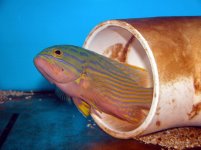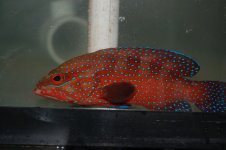Here is an image of a C. polleni and the text from my Advanced Techniques book:
Pollen’s grouper Cephalopholis (Gracila) polleni Serranidae
This rare deep-water grouper is probably the most attractive and most expensive type of grouper available to aquarists. Rather shy when first collected, be sure that they have a secure cave to hide in. As time goes on, they become a bit more outgoing, but still should not be kept with larger aggressive species, or small species that they might swallow. Due to their collection at great depths, Pollen’s groupers need to be decompressed when collectors bring them to the surface. The typical method to accomplish this is to de-gas the fish’s air bladder with a hypodermic needle. While this operation is usually uncomplicated, some fish later develop buoyancy problems. This is evidenced by their swimming head down most of the time combined with a tendency to wedge themselves inside caves to hold their position.
Jay








